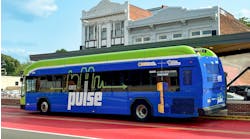MA: Fare jumpers, think twice. Your days are numbered, MBTA boss Phillip Eng says
By John L. Micek
Source masslive.com (TNS)
If you’ve ever skipped out on paying your fare for an MBTA bus, subway or commuter rail train, enjoy it while you can. Those days may soon be at an end.
From “fare engagement” officers to new commuter rail fare gates at the South Station and Back Bay stops, the regional transit agency is doing everything it can to capture the revenue that keeps the doors open and the train rolling, MBTA General Manager Phillip Eng said Wednesday.
“Fare evasion is not something that just happens here at the MBTA, it happens across many transit agencies, and everyone is working on different technologies,” to fix it, Eng said during an appearance on GBH News' “Boston Public Radio” program.
In a letter earlier this month, state Inspector General Jeffrey S. Shapiro underscored the fare collection challenges that the T faces. The agency relies on the revenue from fares for a portion of its operation.
Shapiro said he believes the “scale of the problem of uncollected fares and the resulting lost revenue has been greatly understated over the years.
In many ways, the MBTA has not prioritized fare collection, as demonstrated by the lack of infrastructure to achieve that goal and the treatment of fare collection as an element of the passenger experience rather than the necessary revenue driver it should be," Shapiro continued.
In April 2019, T officials estimated that it was losing $10 million to $20 million a year from commuter rail evasion, Commonwealth Beacon reported. That accounted for about 4% to 8% of the agency’s total revenue.
And while “the lost revenue from uncollected fares would not close the MBTA’s projected budget gap, the impact of uncollected fares is significant,” Shapiro told Eng in that March 4 letter.
“How the MBTA leadership and staff treat one public dollar is as meaningful as how they treat a million dollars. Each dollar must count,” Shapiro wrote.
Speaking to GBH News on Wednesday, Eng said the T had recently hired “fare engagement” employees, readily identifiable by the green shirts they wear, to “educate and engage” with riders about the importance of ponying up.
Right now, however, there only are 16 such employees across the T’s massive system. But even in those limited numbers, the agency has seen a “30% increase in fare collection and fair payment,” after those workers interacted with strap-hangers, Eng said.
“You know the it seems like you know whether you’re not paying the $2.40 [for the subway] or $1.70 on the bus, maybe to the to some folks, it feels like it’s not a big deal,” he said.
“But to the MBTA, every single one of those amount to it. But also on the commuter rail. We’ve been working really hard to make sure that the conductors [who are] walking through the trains are verifying and validating, and every month we’ve seen that go up,” Eng told the station.
©2025 Advance Local Media LLC.
Visit masslive.com.
Distributed by Tribune Content Agency, LLC.

